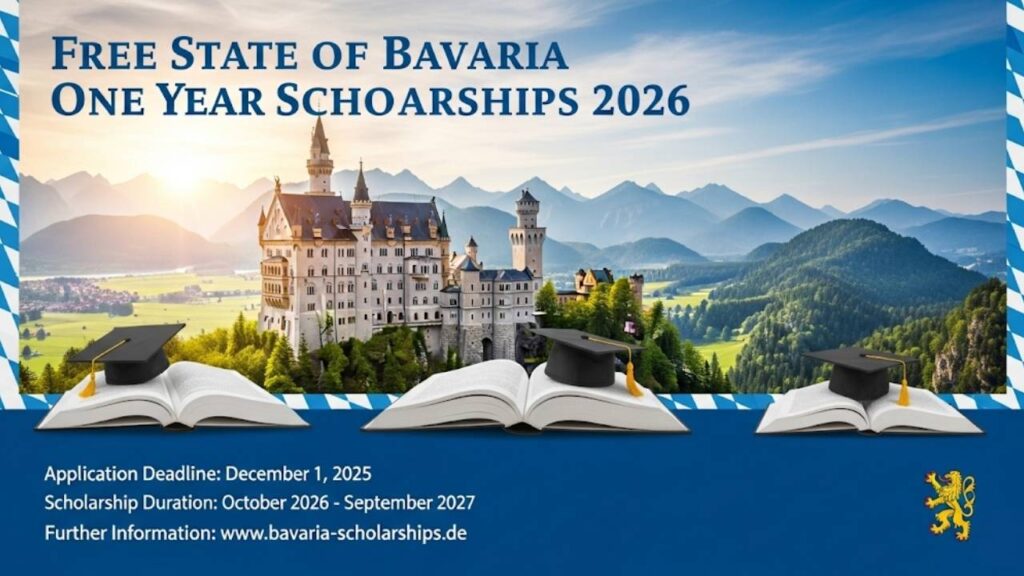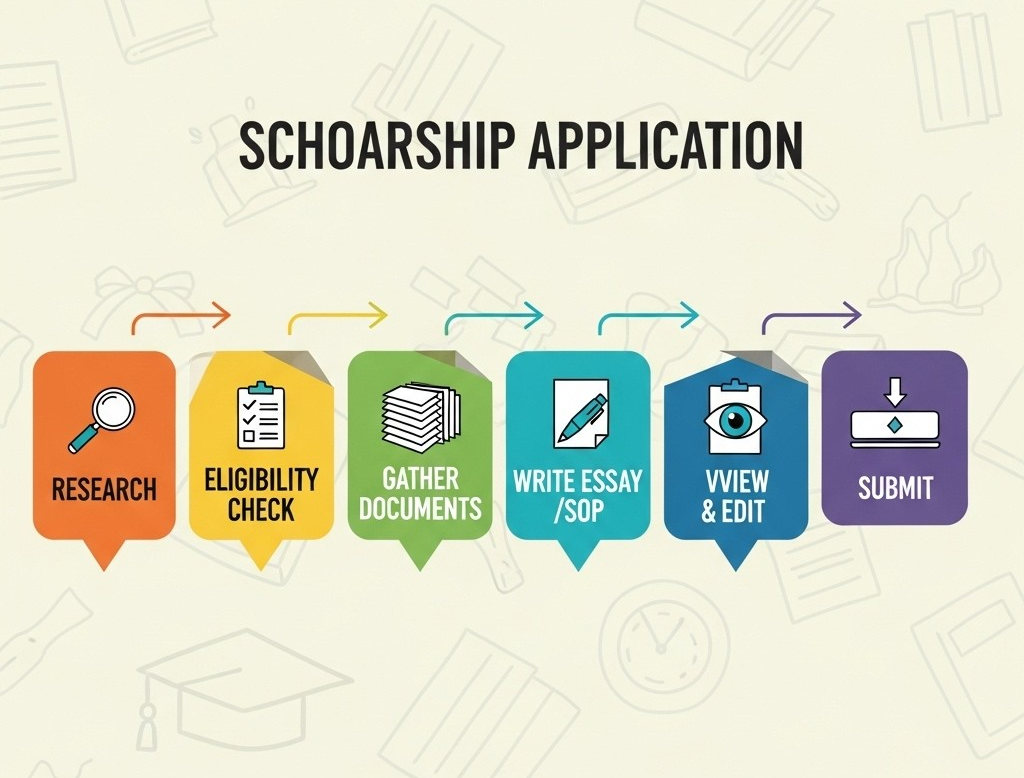Considering postgraduate studies in Germany? The Free State of Bavaria One Year Scholarships 2026 offer an exceptional opportunity for ambitious graduates from Central, Eastern, and Southeastern European countries to pursue their academic dreams. Navigating the scholarship process can feel overwhelming, but with the right information and a structured approach, it’s a goal well within your reach. This article is your definitive guide to understanding the scholarship, its requirements, and how to build a winning application that stands out. I’ve seen many successful applicants focus on a compelling narrative and meticulous preparation, and that’s exactly what we’ll cover here.

The Free State of Bavaria One Year Scholarships 2026 are a gateway to an exceptional academic and personal adventure. While the application process is rigorous, it is also a rewarding journey of self-discovery and goal-setting. By demonstrating your academic excellence, crafting a powerful personal narrative, and preparing each document with care, you can position yourself as a strong candidate. The opportunity to study in Germany and contribute to its rich academic landscape is waiting for you. Start your preparation today and take the first step toward a future full of possibility.
An Overview of This Unique Scholarship Opportunity
The Free State of Bavaria scholarship program is a prestigious initiative designed to foster academic and scientific collaboration between Bavaria and its neighbors. Administered by the Bavarian Academic Center for Central, Eastern and Southeastern Europe (BAYHOST), the scholarship provides substantial financial support for postgraduate studies, PhDs, or research stays.
| Key Fact | Detail |
| Funding Amount | Up to €992 per month (€1152 for students with a child). BAYHOST Official Website |
| Eligible Countries | Bulgaria, Croatia, Czechia, Hungary, Poland, Romania, Russia, Serbia, Slovakia, and Ukraine. |
| Application Deadline | December 1, 2025, for first-time applicants. University of Wrocław |
This is more than just a financial grant; it’s an invitation to join a vibrant academic community and gain international experience in one of Germany’s most dynamic and picturesque regions. From the high-tech industries of Munich to the academic traditions of Regensburg, Bavaria offers a diverse landscape for both your studies and your personal life.
Unpacking the Eligibility Criteria
Before you even begin the application, it’s crucial to confirm you meet the core eligibility criteria. The scholarship is highly competitive, and attention to detail from the start is non-negotiable.
Who Can Apply?
The scholarship is open to graduates with citizenship from one of the following countries:
- Bulgaria
- Croatia
- Czechia
- Hungary
- Poland
- Romania
- Russia
- Serbia
- Slovakia
- Ukraine
In addition to citizenship, applicants must have permanent residence in their home country at the time of application.
What Programs Are Supported?
The scholarships are designed to finance specific types of academic pursuits:
- Postgraduate Master’s programs.
- PhD programs.
- One-year research stays as part of a PhD being conducted in your home country.
Importantly, your chosen program must be at a state or state-funded higher education institution in Bavaria. This can include universities, universities of applied sciences, and art schools. The scholarship also has age limits: for master’s students, you must be under 30, and for PhDs, under 35, at the time the scholarship is first awarded (October 1, 2026). However, justified exceptions are possible, so check the official FAQ for details.

The Power of a Strong Application: Your Key to Success
The application process is entirely online and requires a comprehensive set of documents submitted through the StipSys-form by the December 1 deadline. In my experience advising students, the quality of these documents—not just their completeness—is what makes an application truly shine.
Academic Excellence and Motivation
BAYHOST places significant emphasis on academic performance. Your previous grades, publications, and any academic prizes or awards will be heavily weighed. But it’s not just about a high GPA. You must also demonstrate a clear and compelling motivation for your postgraduate studies in Bavaria. The scholarship committee wants to see a meaningful connection between your past academic work and your future professional goals. For doctoral candidates, this means presenting a convincing and scientifically relevant research project.
Crafting a Standout Motivation Letter
The motivation letter is your chance to tell your story. It’s where you connect the dots between your background, your chosen field of study, and why a scholarship in Bavaria is the perfect next step for you.
- Be specific: Don’t just say you’re passionate about your field. Explain why you’re drawn to a specific university in Bavaria and how a particular professor’s research aligns with your interests.
- Show, don’t just tell: Instead of stating you are dedicated, describe an extracurricular project or a voluntary role that demonstrates your commitment.
- Connect your goals: Explain how this specific program in Bavaria will help you achieve your long-term career aspirations.
Language Proficiency
A crucial requirement is sufficient knowledge of German and/or English, corresponding to the language of your chosen study or research project. This usually means a C1 level according to the Common European Framework of Reference for Languages (CEFR). Proving this with an official certificate is essential.
The Importance of Recommendations
For PhD and one-year research stay applications, a confirmation of supervision from a Bavarian higher education institution is obligatory. You will also need a letter of recommendation from your PhD supervisor at your home institution. This letter provides an external, expert validation of your potential. Even for master’s programs, a strong letter of recommendation can significantly boost your application.

Life as a Bavarian Scholar
A scholarship from the Free State of Bavaria isn’t just about financial support; it’s about becoming part of a community. The program aims to create a network of scholars who will go on to become ambassadors for academic exchange. The monthly stipend of €992 is designed to cover living expenses, and for those with children, the increased amount of €1,152 per month offers valuable support.
Beyond the monetary benefits, you’ll gain access to top-tier research institutions, network with leading experts in your field, and immerse yourself in a new culture. The experience of living and studying abroad can be transformative, helping you develop a broader perspective and skills that will serve you throughout your career.
Social Media & Digital Resources
The online community can be a great source of inspiration and up-to-date information. Check out official and student-run accounts for glimpses into student life in Germany.
Getting Ready to Apply: A Checklist
The application deadline of December 1, 2025, is a fixed date, so start preparing now. Here is a brief checklist to help you stay on track:
- Identify your program: Find a master’s or PhD program at a Bavarian university that aligns with your academic goals.
- Gather documents: Collect your transcripts, diplomas, and any relevant certificates.
- Request recommendations: Give your referees plenty of time to write and submit their letters.
- Draft your motivation letter: Start writing early, revise it multiple times, and have someone you trust read it.
- Prepare for language tests: If needed, register for a language test (e.g., Goethe, TestDaF, TOEFL, IELTS) and prepare diligently to achieve the required C1 level.
A Complete Guide to the International Postgraduate Scholarship 2025 at Anglia Ruskin University
Unlock Your Research Future: A Guide to the SISSA PhD Scholarship 2025 in Italy
FAQ
Q1: Do I need to be accepted to a Bavarian university before I apply for the scholarship?
A: No, you do not need to be enrolled or have an acceptance letter at the time of your scholarship application. However, you must be enrolled at a Bavarian higher education institution when the scholarship is awarded.
Q2: Is there a German language requirement for all programs?
A: No, the language requirement depends on your specific study or research project. You must have sufficient knowledge of either German or English (usually C1 level) to successfully complete your studies.
Q3: Can the scholarship be extended?
A: Yes, the one-year scholarship can be extended up to two times for a total of three years, allowing you to complete your postgraduate studies. The extension application deadline is typically in late February.










